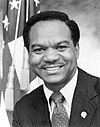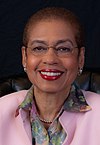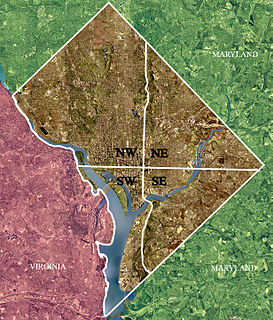Non-voting members of the United States House of Representatives are representatives of their territory in the House of Representatives, who do not have a right to vote on proposed legislation in the full House but nevertheless have floor privileges and are able to participate in certain other House functions. Non-voting members may vote in a House committee of which they are a member and introduce legislation. There are currently six non-voting members: a delegate representing the federal district of Washington D.C., a resident commissioner representing Puerto Rico, and one delegate for each of the other four permanently inhabited US Territories: American Samoa, Guam, the Northern Mariana Islands, and the US Virgin Islands. As with voting members, non-voting delegates are elected every two years, and the Resident Commissioner of Puerto Rico is elected every four years.

The D.C. Statehood Green Party, also known as the D.C. Statehood Party, is a left-wing political party in Washington, D.C. The party is the D.C. affiliate of the national Green Party, but has traditionally been involved primarily with issues related to the District of Columbia statehood movement. Party members sometimes call it the second most popular party in the district because in the 2006 election its candidates won more total votes than the Republican candidates. As of March 31, 2016, there are 3,419 registered voters affiliated with the D.C. Statehood Green Party. That is 0.79% of all registered voters.

The 2008 Maryland Republican primary took place on February 12, 2008. The state sent 37 delegates to the 2008 Republican National Convention in St. Paul, Minnesota. Three delegates were awarded to the winner of each of the state's eight congressional districts; the remainder of the state's delegates were at-large. John McCain won the primary election.
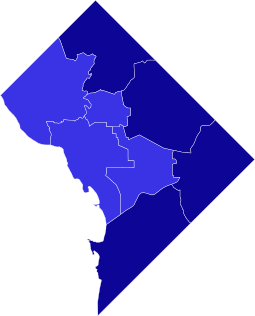
The 2008 congressional election for the Delegate from the District of Columbia was held on November 4, 2008. The winner of the race was incumbent Eleanor Holmes Norton (D).

The United States House of Representatives election in the Northern Mariana Islands, 2008 took place on November 4, 2008 and was the Northern Mariana Islands' first election of a delegate to the United States House of Representatives. Since the CNMI traditionally had general elections in odd-numbered years, the November 2008 ballot contained only this office.

The 2010 congressional election for the Delegate from the District of Columbia was held on November 2, 2010. The winner of the race is to serve in the 112th Congress from January 3, 2011, until January 3, 2013.

The 1990 congressional election for the Delegate from the District of Columbia was held on November 6, 1990. Incumbent Walter E. Fauntroy (D) had stepped down earlier to run for Mayor of Washington, D.C.. Eleanor Holmes Norton (D) won the open seat. All elected members would serve in 102nd United States Congress.

The 2012 United States presidential election in California took place on November 6, 2012, as part of the 2012 general election in which all 50 states plus The District of Columbia participated. California voters chose 55 electors, the most out of any state, to represent them in the Electoral College via a popular vote pitting incumbent Democratic President Barack Obama and his running mate, Vice President Joe Biden, against Republican challenger and former Massachusetts Governor Mitt Romney and his running mate, Congressman Paul Ryan.

The 2012 United States presidential election in Tennessee took place on November 6, 2012, as part of the 2012 General Election in which all 50 states plus The District of Columbia participated. Tennessee voters chose 11 electors to represent them in the Electoral College via a popular vote pitting incumbent Democratic President Barack Obama and his running mate, Vice President Joe Biden, against Republican challenger and former Massachusetts Governor Mitt Romney and his running mate, Congressman Paul Ryan.

The 2012 United States presidential election in Kansas took place on November 6, 2012, as part of the 2012 General Election in which all 50 states plus The District of Columbia participated. Kansas voters chose six electors to represent them in the Electoral College via a popular vote pitting incumbent Democratic President Barack Obama and his running mate, Vice President Joe Biden, against Republican challenger and former Massachusetts Governor Mitt Romney and his running mate, Congressman Paul Ryan. Romney and Ryan carried Kansas with 59.66% of the popular vote to Obama's and Biden's 38.05%, thus winning the state's six electoral votes.

The 2012 United States presidential election in Nebraska took place on November 6, 2012, as part of the 2012 General Election in which all 50 states plus The District of Columbia participated. Nebraska voters chose five electors to represent them in the Electoral College via a popular vote pitting incumbent Democratic President Barack Obama and his running mate, Vice President Joe Biden, against Republican challenger and former Massachusetts Governor Mitt Romney and his running mate, Congressman Paul Ryan.
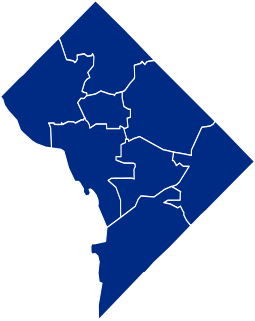
The 2006 congressional election for the Delegate from the District of Columbia was held on November 7, 2006. The winner of the race was incumbent Eleanor Holmes Norton (D).

The 1971 special congressional election for the Delegate from the District of Columbia was held on March 23, 1971. This was the first election for the newly re-created district since Norton P. Chipman (R) briefly held the seat during the Reconstruction Era. The winner of the race was Walter E. Fauntroy (D). After serving his remaining term in 92nd United States Congress, he would continue to be re-elected until he stepped down to run for mayor in the 1990 election.

The 1978 congressional election for the Delegate from the District of Columbia was held on November 7, 1978. The winner of the race was Walter E. Fauntroy (D), who won his fourth re-election. All elected members would serve in 96th United States Congress.

The 1984 congressional election for the Delegate from the District of Columbia was held on November 6, 1984. The winner of the race was Walter E. Fauntroy (D), who won his seventh re-election. All elected members would serve in 99th United States Congress.

The 1992 congressional election for the Delegate from the District of Columbia was held on November 3, 1992. The winner of the race was Eleanor Holmes Norton (D), who won her first re-election. All elected members would serve in 103rd United States Congress.

The 1994 congressional election for the Delegate from the District of Columbia was held on November 8, 1994. The winner of the race was Eleanor Holmes Norton (D), who won her second re-election. All elected members would serve in 104th United States Congress.

The 1996 congressional election for the Delegate from the District of Columbia was held on November 5, 1996. The winner of the race was Eleanor Holmes Norton (D), who won her third re-election. All elected members would serve in 105th United States Congress.

The 1998 congressional election for the Delegate from the District of Columbia was held on November 3, 1998. The winner of the race was Eleanor Holmes Norton (D), who won her fourth re-election. All elected members would serve in 106th United States Congress.




